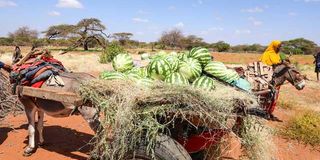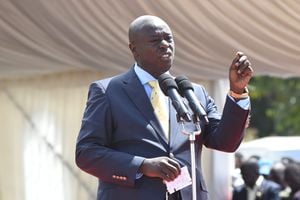Miss not forest for the trees of revenue share

Donkey carts are loaded with watermelons at Dahiya's farm in Elnur, Wajir County.
The debate on revenue allocation and distribution is as old as Kenya. Sessional Paper No. 10 of 1965, a blueprint for economic and social development, was the first government policy paper on revenue distribution and sharing.
Favouring areas with high economic potential with resources and economic patronage, it entrenched economic disparity and set the pace for the economic marginalisation of areas not well endowed in terms of economic resources. During the ‘Second Liberation’ struggle, the political elite from the economically marginalised regions emphasised equitable distribution of national resources.
The drafters of the 2010 Constitution, cognizant of the adverse effects of SP #10, were keen on public finance usage, allocation and distribution in the supreme law. Chapter 12 heavily dwells on that.
Article 201(b)(iii) states that the public finance system shall promote an equitable society and public expenditure promote equitable development, including by making special provisions for marginalised groups and areas. Art. 203 lays out factors to be considered in resource allocation—including economic disparities within and among counties, the need to remedy them and affirmative action in respect of disadvantaged areas and groups. The constitutional Equalisation Fund to “bring the quality of those services in those areas to the level generally enjoyed by the rest of the nation”.
The import of the constitutional provisions is threefold. One, the Constitution recognises SP #10’s bad precedent in the allocation and distribution of national resources. Two, it emphasises equality and affirmative action for true equality and economic emancipation. Three, it has clear guidelines and criteria for equity in resource sharing.
National unity
Art. 43 gives Kenyans the right to the highest attainable standard of health, accessible and adequate housing, freedom from hunger and access to clean and safe water, education and social security. But we have Wajir County, which is 59,000 square kilometres, compared to, say, Kiambu, 2,449 km sq.
As Art. 174 posits, the objects of devolution include fostering national unity, promoting socioeconomic development and ensuring equitable sharing of resources. National unity and cohesion very much hinges on the equitable sharing of resources.
Art. 73 expects state officers to demonstrate respect for the people, bring honour and dignity to the office and promote public confidence in the integrity of the office. They must be objective and impartial in decision-making, not influenced by nepotism, favouritism and other improper motives.
The “one man, one vote, one shilling” campaign is unconstitutional and a threat to national unity. Ethnic populism and the “Us versus Them” mantra is a retrogressive political misadventure. The state officers driving this call are in violation of Chapter 6 of the Constitution, on ethics and integrity. They must always seek common ground and act and work for the good of all the citizens and the entire nation, not their preferred community or enclave.
Mr Yussuf is the Speaker of Wajir County Assembly. [email protected].





